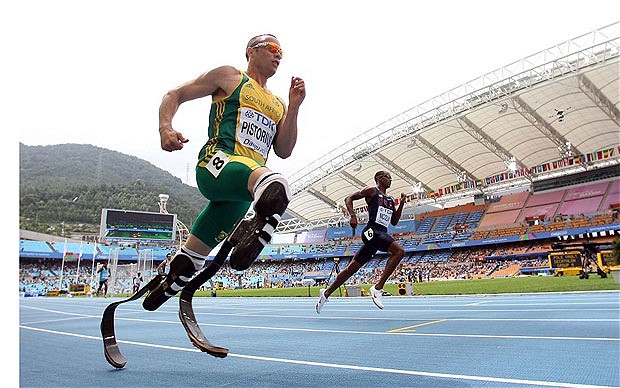
In 2009, Usain Bolt, a sprinter from Jamaica, shocked the world by setting a world record of 9.58 seconds in the 100-meter dash at 2009 World Championships in Berlin, Germany. Two years later, in 2011, Oscar Pistorius, a sprinter from South Africa, advanced to semi-finals after running a 400-meter dash in 45.39 seconds at the Daegu World Championship in South Korea. Although Pistorius’s achievement is a lot less substantial than that of Bolt’s, Pretorius’s physical limitation sets him off from other runners: he has no legs.
Born in November 1986 in Johannesburg, South Africa, Pistorius had congenital absence of the fibula in both legs, which gave him short, deformed legs. When he was 11 months old, his legs were amputated halfway between his knees and his ankles. Instead of prosthetic legs, Pistorius opted to wearing blades, which are carbon-fibre prosthetics that are shaped like the letter J. While attending Pretoria Boys High School, Pistorius participated in rugby, water polo, tennis, in which he demonstrated his athletic ability that is still serving him in the form of running.
Pistorius’s first competitive running experience was in the 2004 Summer Paralympics in Athens, Greece where he took third place overall in the 100-meter dash event. He went onto set the world record for the 200-meter dash at the same Paralympic with a time of 21.97 seconds. At the 2008 Summer Paralympics in Beijing, China, he broke his personal record for the 100- meter dash with 11.16 seconds. In the end, Pistorius completed a hat-trick, meaning that he won gold medal in three different categories: the 100-meter dash, the 200-meter dash, and the 400-meter dash.
Perhaps his biggest accomplishment thus far was competing against able-bodied athletes at the World Championship in Daegu in 2011. In the 400-meter dash, Pistorius ran 45.39 seconds and advanced to the semifinals, but he was eliminated in the semifinals for running a fraction of a second late.
Due to his immense running speed, many sports critics stated that Pistorius’s carbon-fibre prosthetics are giving him an advantage over runners without artificial limbs. Consequently, the International Association of Athletics Federation, or the IAAF, added a regulation that subsequently banned Pistorius from competing in any IAAF-regulated competitions. Pistorius worked ceaselessly to lift the ban that was enacted against him, and on May 16, 2008, the Court of Arbitration for Sports revoked the IAAF council’s decision.
Pistorius is also the first double amputee athlete qualified to qualify for the London Olympics this coming summer. In the end, however, he was not able to qualify to actually compete in the London Olympics. In order to compete, Pistorius had to run the 400-meter dash in less than 45.30 seconds. Unfortunately, his time was 45.52 seconds- 0.22 seconds too slow to qualify.
Despite the successes and the failures he had to endure, Pistorius still sticks to his motto: “You’re not disabled by the disabilities you have, you are able by the abilities you have.”

